Roberts A.D. The Cambridge History of Africa, Volume 7: from 1905 to 1940
Подождите немного. Документ загружается.

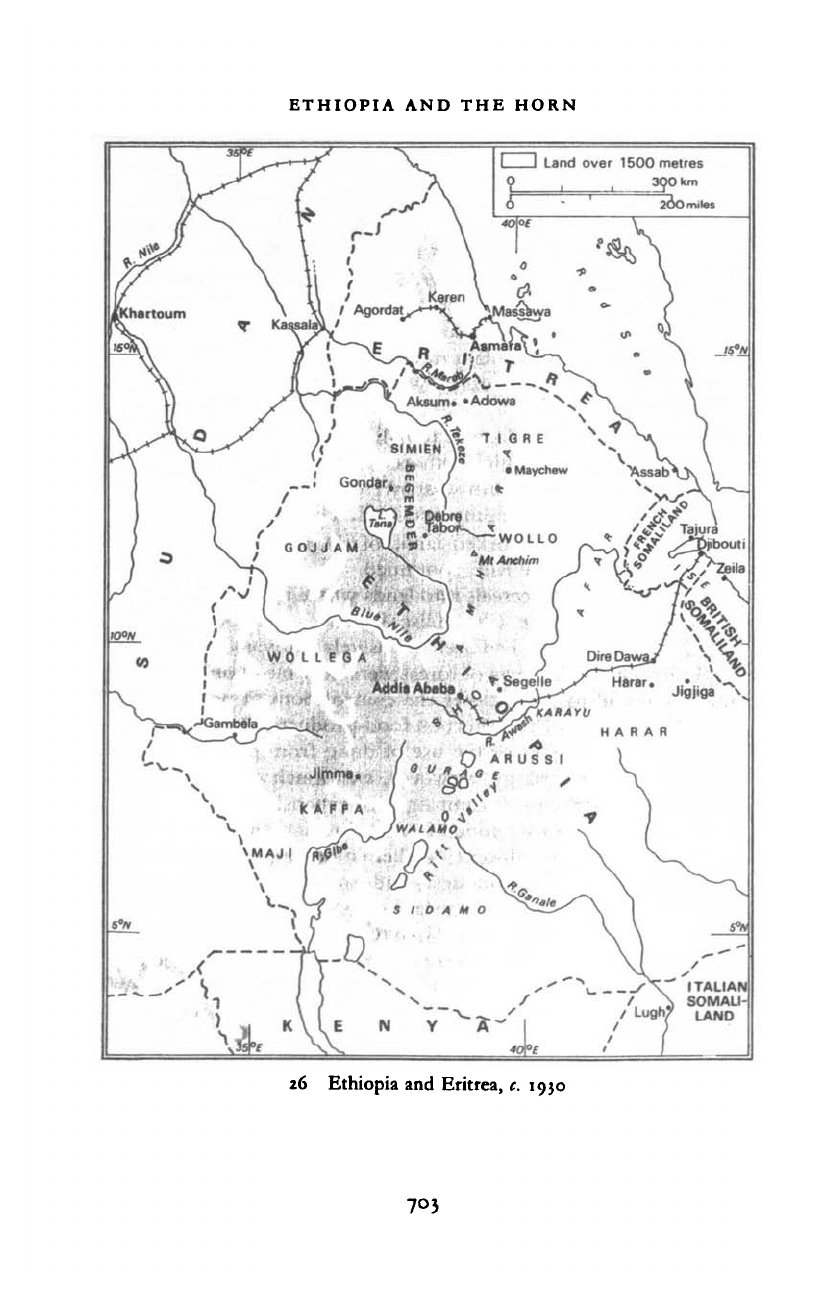
ETHIOPIA AND THE HORN
I
I
Land over 1500 metres
9
.
.390 km
:
'
200 miles
ITALIAN
SOMAU-
LAND
26 Ethiopia
and
Eritrea,
;. 1930
7O3
Cambridge Histories Online © Cambridge University Press, 2008
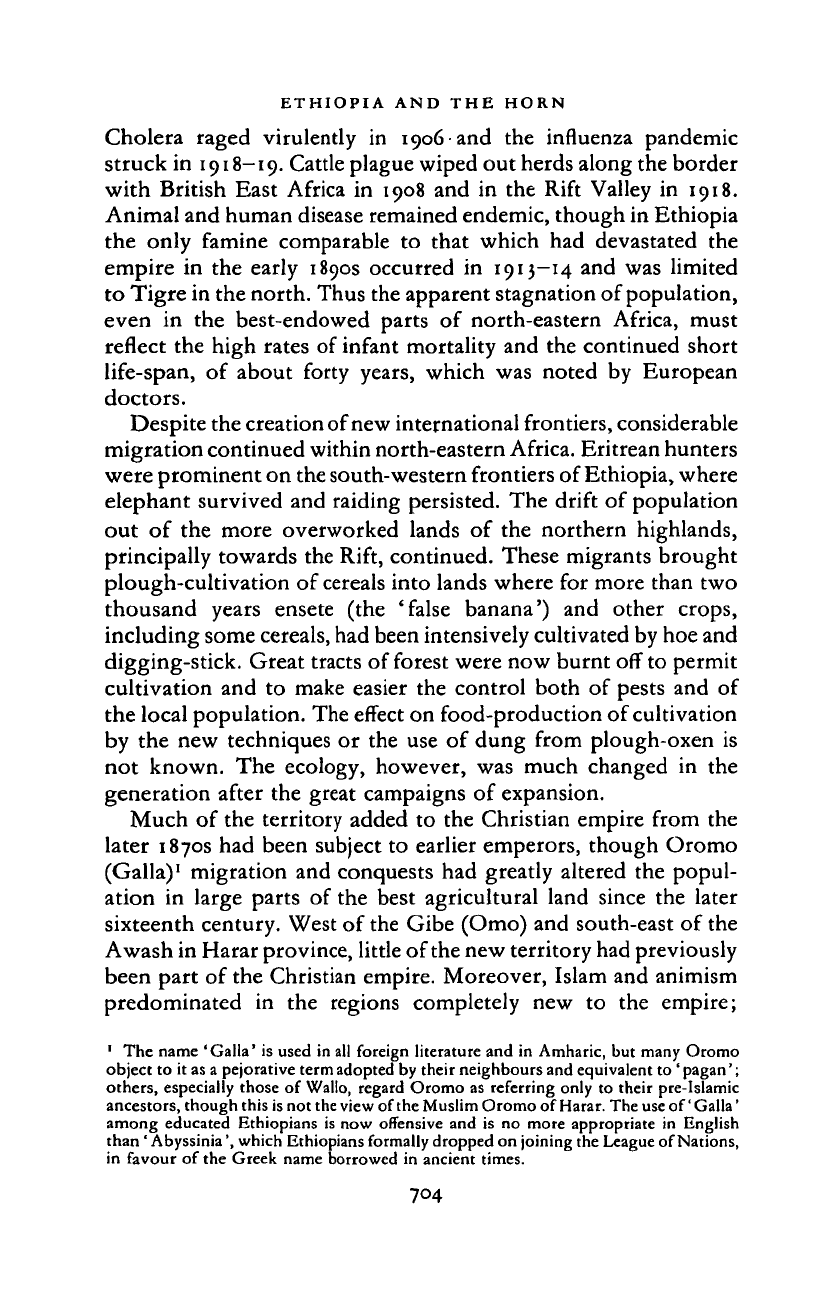
ETHIOPIA AND THE HORN
Cholera raged virulently in 1906 and the influenza pandemic
struck in 1918-19. Cattle plague wiped out herds along the border
with British East Africa in 1908 and in the Rift Valley in 1918.
Animal and human disease remained endemic, though in Ethiopia
the only famine comparable to that which had devastated the
empire in the early 1890s occurred in 1913-14 and was limited
to Tigre in the north. Thus the apparent stagnation of population,
even in the best-endowed parts of north-eastern Africa, must
reflect the high rates of infant mortality and the continued short
life-span, of about forty years, which was noted by European
doctors.
Despite the creation of new international frontiers, considerable
migration continued within north-eastern Africa. Eritrean hunters
were prominent on the south-western frontiers of Ethiopia, where
elephant survived and raiding persisted. The drift of population
out of the more overworked lands of the northern highlands,
principally towards the Rift, continued. These migrants brought
plough-cultivation of cereals into lands where for more than two
thousand years ensete (the 'false banana') and other crops,
including some cereals, had been intensively cultivated by hoe and
digging-stick. Great tracts of forest were now burnt off to permit
cultivation and to make easier the control both of pests and of
the local population. The effect on food-production of cultivation
by the new techniques or the use of dung from plough-oxen is
not known. The ecology, however, was much changed in the
generation after the great campaigns of expansion.
Much of the territory added to the Christian empire from the
later 1870s had been subject to earlier emperors, though Oromo
(Galla)
1
migration and conquests had greatly altered the popul-
ation in large parts of the best agricultural land since the later
sixteenth century. West of the Gibe (Omo) and south-east of the
Awash in Harar province, little of the new territory had previously
been part of the Christian empire. Moreover, Islam and animism
predominated in the regions completely new to the empire;
1
The name 'Galla' is used in all foreign literature and in Amharic, but many Oromo
object to it as a pejorative term adopted by their neighbours and equivalent to ' pagan';
others, especially those of Wallo, regard Oromo as referring only to their pre-Islamic
ancestors, though this is not the view of the Muslim Oromo of
Harar.
The use of' Galla'
among educated Ethiopians is now offensive and is no more appropriate in English
than ' Abyssinia', which Ethiopians formally dropped on joining the League of Nations,
in favour of the Greek name borrowed in ancient times.
704
Cambridge Histories Online © Cambridge University Press, 2008
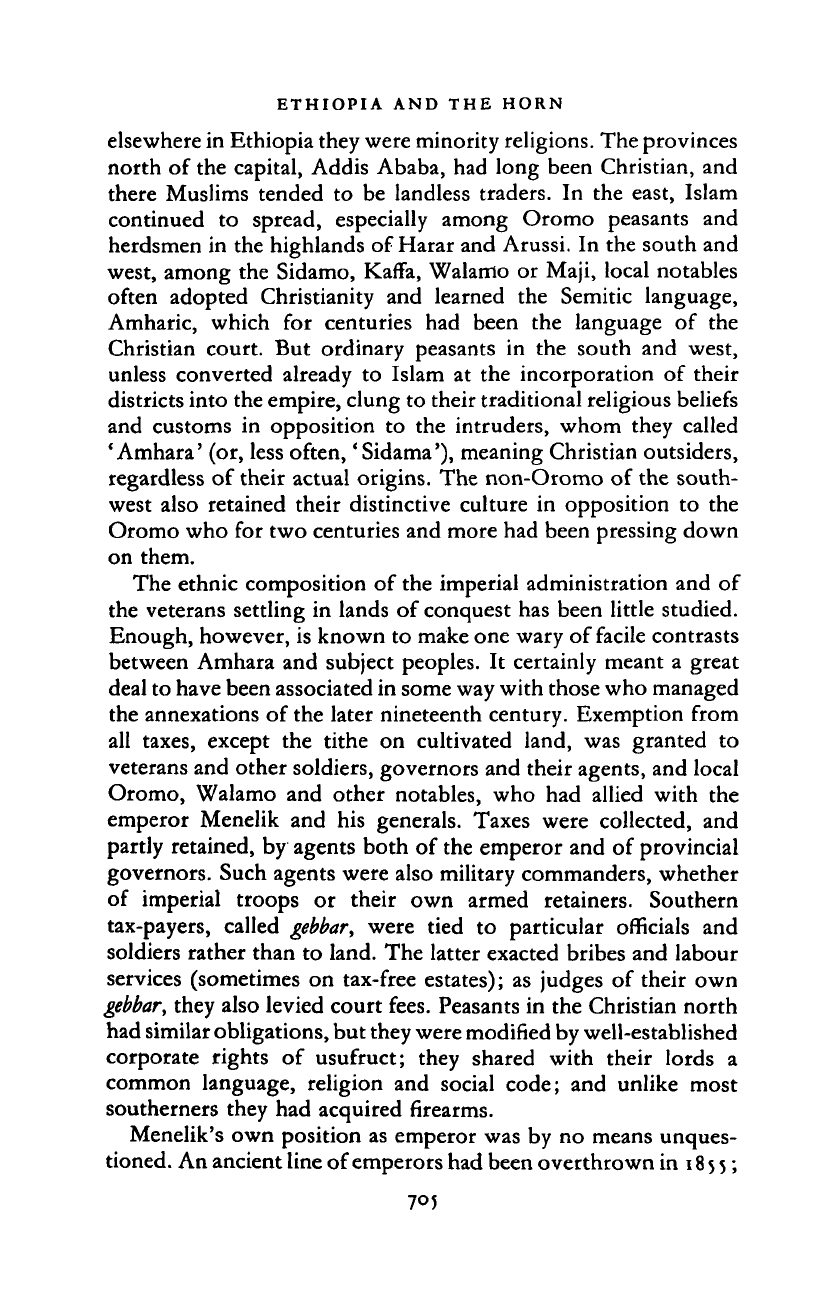
ETHIOPIA AND THE HORN
elsewhere in Ethiopia they were minority religions. The provinces
north of the capital, Addis Ababa, had long been Christian, and
there Muslims tended to be landless traders. In the east, Islam
continued to spread, especially among Oromo peasants and
herdsmen in the highlands of Harar and Arussi. In the south and
west, among the Sidamo, Kaffa, Walarrto or Maji, local notables
often adopted Christianity and learned the Semitic language,
Amharic, which for centuries had been the language of the
Christian court. But ordinary peasants in the south and west,
unless converted already to Islam at the incorporation of their
districts into the empire, clung to their traditional religious beliefs
and customs in opposition to the intruders, whom they called
'Amhara' (or, less often,' Sidama'), meaning Christian outsiders,
regardless of their actual origins. The non-Oromo of the south-
west also retained their distinctive culture in opposition to the
Oromo who for two centuries and more had been pressing down
on them.
The ethnic composition of the imperial administration and of
the veterans settling in lands of conquest has been little studied.
Enough, however, is known to make one wary of facile contrasts
between Amhara and subject peoples. It certainly meant a great
deal to have been associated in some way with those who managed
the annexations of the later nineteenth century. Exemption from
all taxes, except the tithe on cultivated land, was granted to
veterans and other soldiers, governors and their agents, and local
Oromo, Walamo and other notables, who had allied with the
emperor Menelik and his generals. Taxes were collected, and
partly retained, by agents both of the emperor and of provincial
governors. Such agents were also military commanders, whether
of imperial troops or their own armed retainers. Southern
tax-payers, called
gebbar,
were tied to particular officials and
soldiers rather than to land. The latter exacted bribes and labour
services (sometimes on tax-free estates); as judges of their own
gebbar,
they also levied court fees. Peasants in the Christian north
had similar obligations, but they were modified by well-established
corporate rights of usufruct; they shared with their lords a
common language, religion and social code; and unlike most
southerners they had acquired firearms.
Menelik's own position as emperor was by no means unques-
tioned. An ancient line of emperors had been overthrown in 1855;
7O5
Cambridge Histories Online © Cambridge University Press, 2008
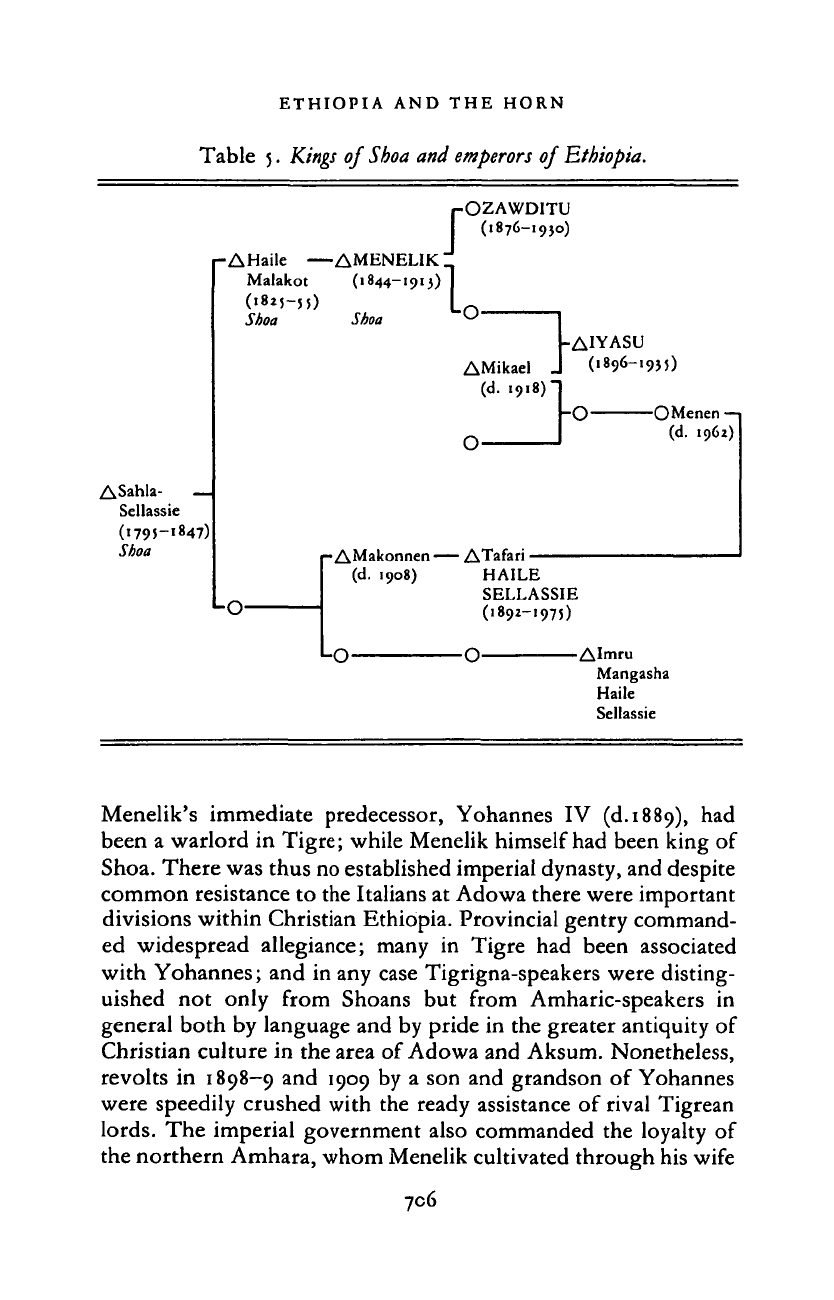
ETHIOPIA AND THE HORN
Table 5.
Kings
of
Shoa
and
emperors
of Ethiopia.
pAHaile AMENEL1K
Malakot (1844-
(182J-J5)
Shoa Shoa
ASahla- —
Sellassie
(1795-1847)
Shoa
J
«9«3) I
OZAWDITU
(1876-19J0)
-AIYASU
AMikael _
(d.
1918)
O-
(1896-19)5)
-o-
-OMenen
—|
(d.
1962)
L
o-
• AMakonnen ATafari —
(d.
1908) HAILE
SELLASSIE
(1892-1975)
L
o-
-o-
Mangasha
Haile
Sellassie
Menelik's immediate predecessor, Yohannes IV (d.1889), had
been a warlord in Tigre; while Menelik himself had been king of
Shoa. There was thus no established imperial dynasty, and despite
common resistance to the Italians at Adowa there were important
divisions within Christian Ethiopia. Provincial gentry command-
ed widespread allegiance; many in Tigre had been associated
with Yohannes; and in any case Tigrigna-speakers were disting-
uished not only from Shoans but from Amharic-speakers in
general both by language and by pride in the greater antiquity of
Christian culture in the area of Adowa and Aksum. Nonetheless,
revolts in 1898-9 and 1909 by a son and grandson of Yohannes
were speedily crushed with the ready assistance of rival Tigrean
lords.
The imperial government also commanded the loyalty of
the northern Amhara, whom Menelik cultivated through his wife
706
Cambridge Histories Online © Cambridge University Press, 2008
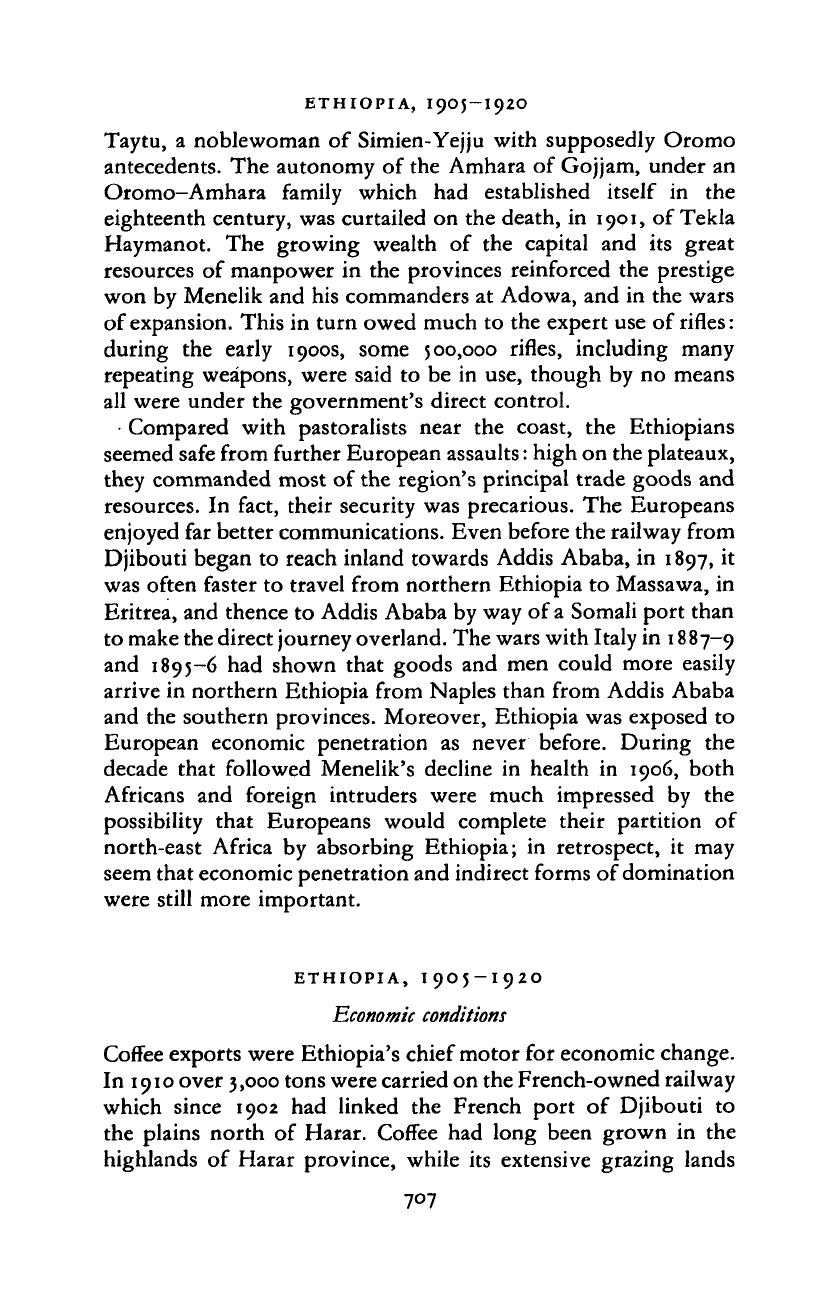
ETHIOPIA, 1905 —I92O
Taytu, a noblewoman of Simien-Yejju with supposedly Oromo
antecedents. The autonomy of the Amhara of Gojjam, under an
Oromo-Amhara family which had established itself in the
eighteenth century, was curtailed on the death, in 1901, of Tekla
Haymanot. The growing wealth of the capital and its great
resources of manpower in the provinces reinforced the prestige
won by Menelik and his commanders at Adowa, and in the wars
of expansion. This in turn owed much to the expert use of rifles:
during the early 1900s, some 500,000 rifles, including many
repeating weapons, were said to be in use, though by no means
all were under the government's direct control.
Compared with pastoralists near the coast, the Ethiopians
seemed safe from further European assaults: high on the plateaux,
they commanded most of the region's principal trade goods and
resources. In fact, their security was precarious. The Europeans
enjoyed far better communications. Even before the railway from
Djibouti began to reach inland towards Addis Ababa, in 1897, it
was often faster to travel from northern Ethiopia to Massawa, in
Eritrea, and thence to Addis Ababa by way of
a
Somali port than
to make the direct journey overland. The wars with Italy in 1887-9
and 1895-6 had shown that goods and men could more easily
arrive in northern Ethiopia from Naples than from Addis Ababa
and the southern provinces. Moreover, Ethiopia was exposed to
European economic penetration as never before. During the
decade that followed Menelik's decline in health in 1906, both
Africans and foreign intruders were much impressed by the
possibility that Europeans would complete their partition of
north-east Africa by absorbing Ethiopia; in retrospect, it may
seem that economic penetration and indirect forms of domination
were still more important.
ETHIOPIA, 1905-1920
Economic conditions
Coffee exports were Ethiopia's chief motor for economic change.
In 1910 over 3,000 tons were carried on the French-owned railway
which since 1902 had linked the French port of Djibouti to
the plains north of Harar. Coffee had long been grown in the
highlands of Harar province, while its extensive grazing lands
7°7
Cambridge Histories Online © Cambridge University Press, 2008
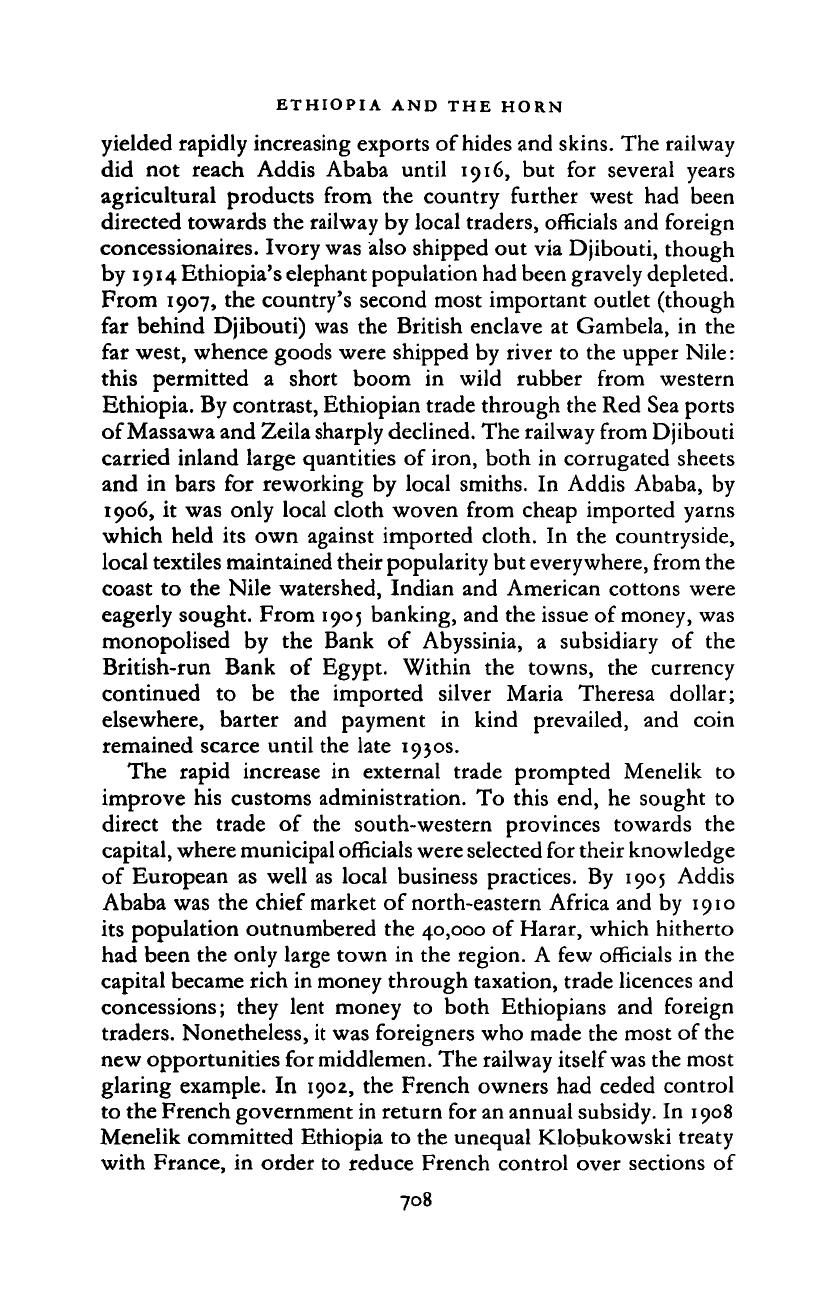
ETHIOPIA AND THE HORN
yielded rapidly increasing exports of hides and skins. The railway
did
not
reach Addis Ababa until 1916,
but for
several years
agricultural products from the country further west had been
directed towards the railway by local traders, officials and foreign
concessionaires. Ivory was also shipped out via Djibouti, though
by
1914
Ethiopia's elephant population had been gravely depleted.
From 1907, the country's second most important outlet (though
far behind Djibouti) was the British enclave
at
Gambela, in the
far west, whence goods were shipped by river to the upper Nile:
this permitted
a
short boom
in
wild rubber from western
Ethiopia. By contrast, Ethiopian trade through the Red Sea ports
of Massawa and Zeila sharply declined. The railway from Djibouti
carried inland large quantities of iron, both in corrugated sheets
and
in
bars for reworking by local smiths.
In
Addis Ababa, by
1906,
it
was only local cloth woven from cheap imported yarns
which held its own against imported cloth. In the countryside,
local textiles maintained their popularity but everywhere, from the
coast to the Nile watershed, Indian and American cottons were
eagerly sought. From 1905 banking, and the issue of money, was
monopolised
by the
Bank
of
Abyssinia,
a
subsidiary
of the
British-run Bank
of
Egypt. Within
the
towns,
the
currency
continued
to be the
imported silver Maria Theresa dollar;
elsewhere, barter
and
payment
in
kind prevailed,
and
coin
remained scarce until the late 1930s.
The rapid increase
in
external trade prompted Menelik
to
improve his customs administration. To this end, he sought
to
direct
the
trade
of
the south-western provinces towards
the
capital, where municipal officials were selected for their knowledge
of European as well as local business practices. By 1905 Addis
Ababa was the chief market of north-eastern Africa and by 1910
its population outnumbered the 40,000 of Harar, which hitherto
had been the only large town in the region. A few officials in the
capital became rich in money through taxation, trade licences and
concessions; they lent money
to
both Ethiopians and foreign
traders. Nonetheless, it was foreigners who made the most of the
new opportunities for middlemen. The railway itself was the most
glaring example.
In
1902, the French owners had ceded control
to the French government in return for an annual subsidy. In 1908
Menelik committed Ethiopia to the unequal Klobukowski treaty
with France, in order to reduce French control over sections of
708
Cambridge Histories Online © Cambridge University Press, 2008
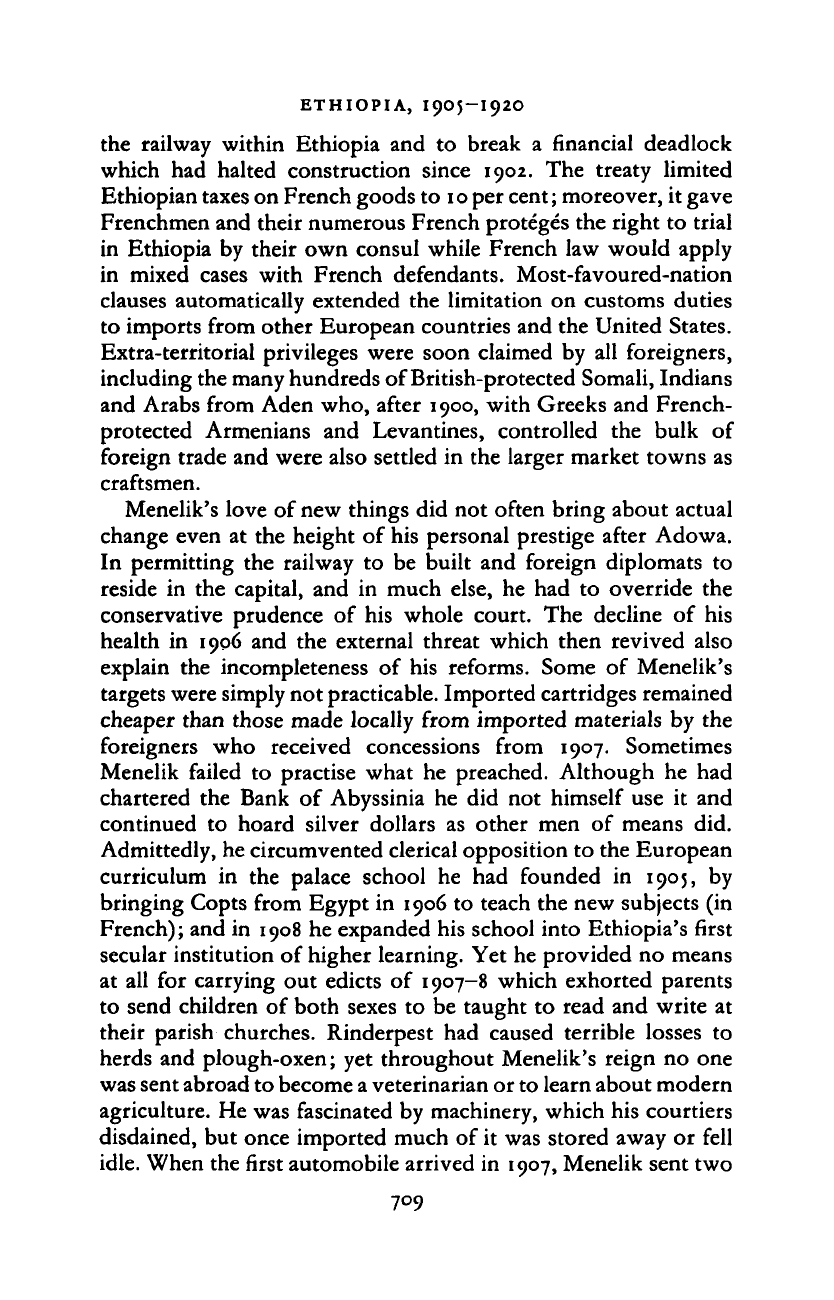
ETHIOPIA, 1905 —1920
the railway within Ethiopia and to break a financial deadlock
which had halted construction since 1902. The treaty limited
Ethiopian taxes on French goods to
10
per cent; moreover, it gave
Frenchmen and their numerous French proteges the right to trial
in Ethiopia by their own consul while French law would apply
in mixed cases with French defendants. Most-favoured-nation
clauses automatically extended the limitation on customs duties
to imports from other European countries and the United States.
Extra-territorial privileges were soon claimed by all foreigners,
including the many hundreds of British-protected Somali, Indians
and Arabs from Aden who, after 1900, with Greeks and French-
protected Armenians and Levantines, controlled the bulk of
foreign trade and were also settled in the larger market towns as
craftsmen.
Menelik's love of new things did not often bring about actual
change even at the height of his personal prestige after Adowa.
In permitting the railway to be built and foreign diplomats to
reside in the capital, and in much else, he had to override the
conservative prudence of his whole court. The decline of his
health in 1906 and the external threat which then revived also
explain the incompleteness of his reforms. Some of Menelik's
targets were simply not practicable. Imported cartridges remained
cheaper than those made locally from imported materials by the
foreigners who received concessions from 1907. Sometimes
Menelik failed to practise what he preached. Although he had
chartered the Bank of Abyssinia he did not himself use it and
continued to hoard silver dollars as other men of means did.
Admittedly, he circumvented clerical opposition to the European
curriculum in the palace school he had founded in 1905, by
bringing Copts from Egypt in 1906 to teach the new subjects (in
French); and in 1908 he expanded his school into Ethiopia's first
secular institution of higher learning. Yet he provided no means
at all for carrying out edicts of 1907-8 which exhorted parents
to send children of both sexes to be taught to read and write at
their parish churches. Rinderpest had caused terrible losses to
herds and plough-oxen; yet throughout Menelik's reign no one
was sent abroad to become
a
veterinarian or to learn about modern
agriculture. He was fascinated by machinery, which his courtiers
disdained, but once imported much of it was stored away or fell
idle.
When the first automobile arrived in 1907, Menelik sent two
709
Cambridge Histories Online © Cambridge University Press, 2008
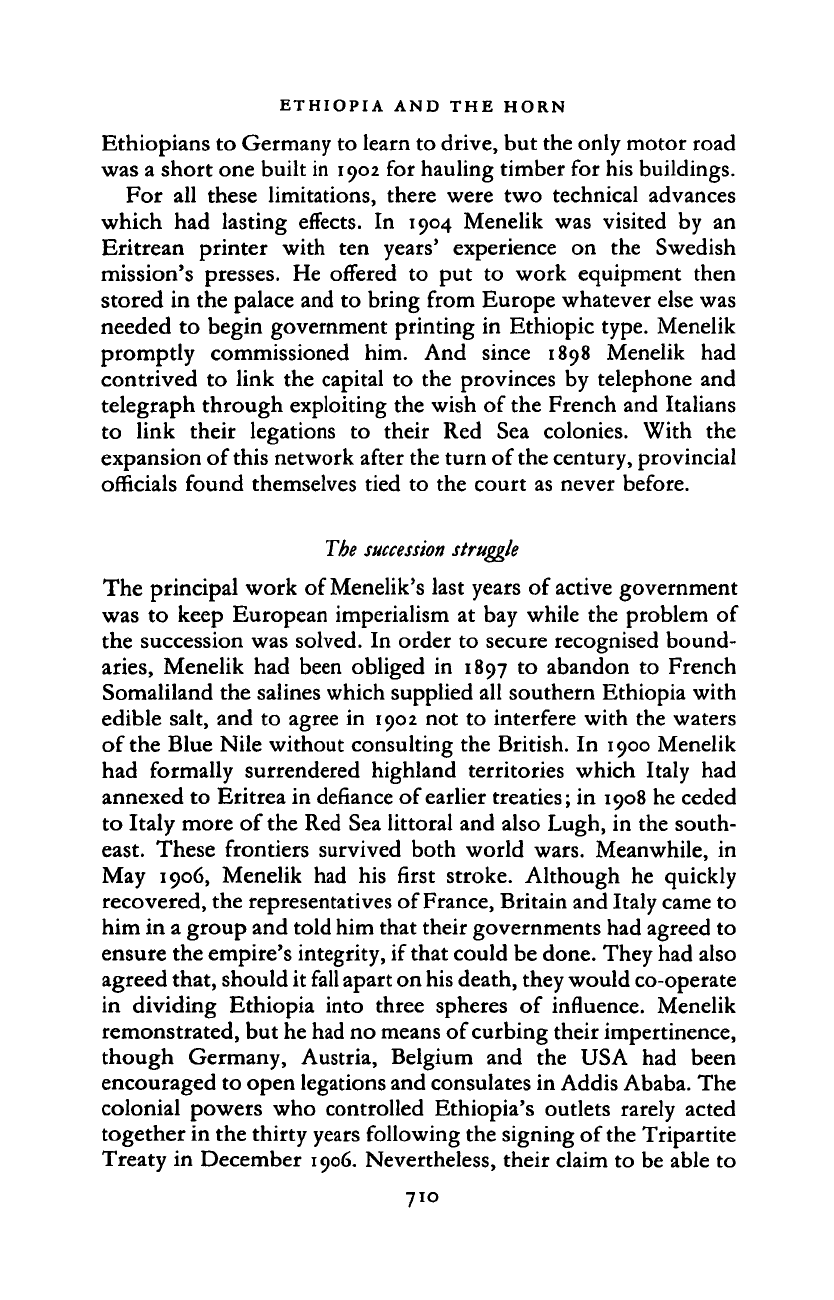
ETHIOPIA AND THE HORN
Ethiopians to Germany to learn to drive, but the only motor road
was a short one built in 1902 for hauling timber for his buildings.
For all these limitations, there were two technical advances
which had lasting effects.
In
1904 Menelik was visited
by an
Eritrean printer with
ten
years' experience
on the
Swedish
mission's presses. He offered
to
put
to
work equipment then
stored in the palace and to bring from Europe whatever else was
needed to begin government printing in Ethiopic type. Menelik
promptly commissioned him.
And
since 1898 Menelik
had
contrived
to
link the capital
to
the provinces by telephone and
telegraph through exploiting the wish of the French and Italians
to link their legations
to
their Red
Sea
colonies. With
the
expansion of this network after the turn of the century, provincial
officials found themselves tied to the court as never before.
The succession struggle
The principal work of Menelik's last years of active government
was
to
keep European imperialism
at
bay while the problem of
the succession was solved. In order to secure recognised bound-
aries,
Menelik had been obliged
in
1897
to
abandon
to
French
Somaliland the salines which supplied all southern Ethiopia with
edible salt, and to agree in 1902 not to interfere with the waters
of the Blue Nile without consulting the British. In 1900 Menelik
had formally surrendered highland territories which Italy had
annexed to Eritrea in defiance of earlier treaties; in 1908 he ceded
to Italy more of the Red Sea littoral and also Lugh, in the south-
east. These frontiers survived both world wars. Meanwhile,
in
May 1906, Menelik had
his
first stroke. Although
he
quickly
recovered, the representatives of France, Britain and Italy came to
him in a group and told him that their governments had agreed to
ensure the empire's integrity, if that could be done. They had also
agreed that, should it fall apart on his death, they would co-operate
in dividing Ethiopia into three spheres
of
influence. Menelik
remonstrated, but he had no means of curbing their impertinence,
though Germany, Austria, Belgium
and the
USA
had
been
encouraged to open legations and consulates in Addis Ababa. The
colonial powers who controlled Ethiopia's outlets rarely acted
together in the thirty years following the signing of the Tripartite
Treaty in December 1906. Nevertheless, their claim to be able to
710
Cambridge Histories Online © Cambridge University Press, 2008
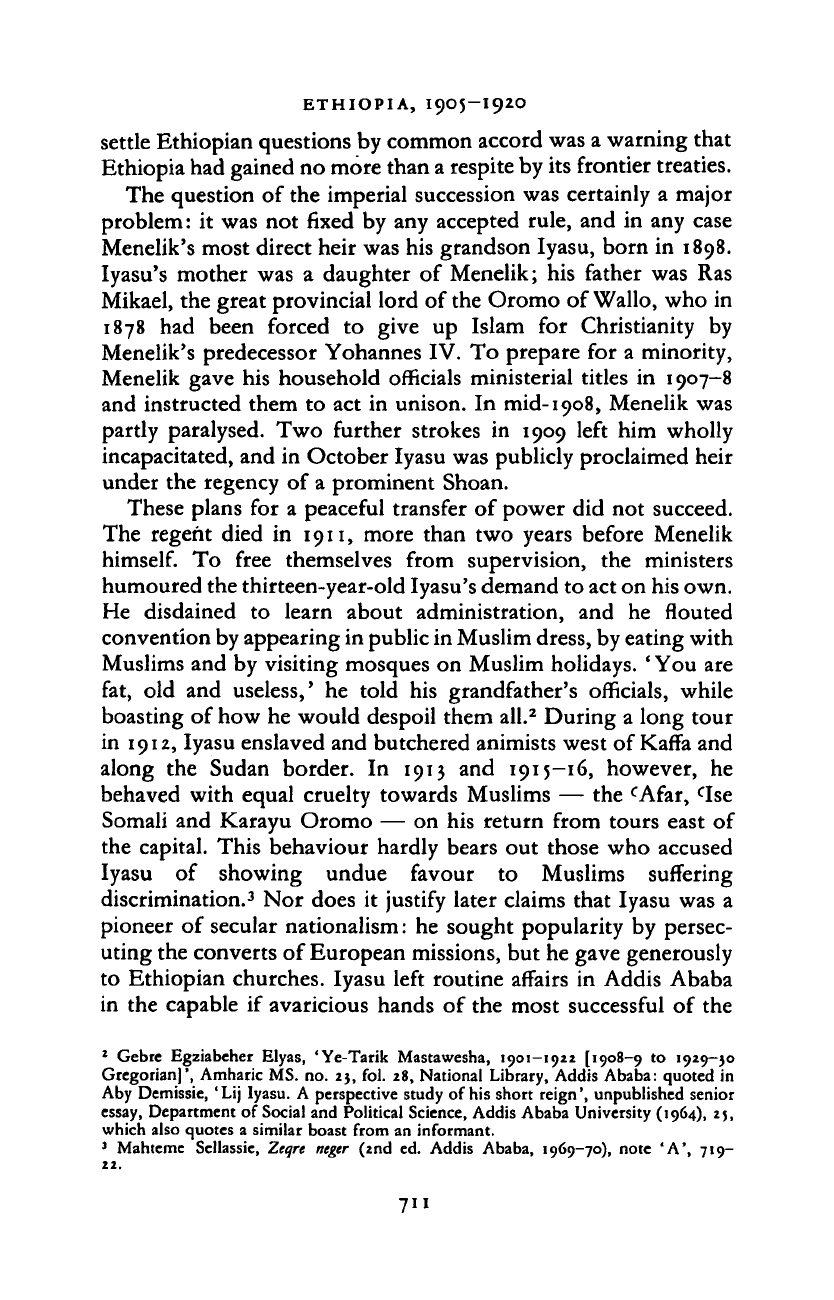
ETHIOPIA, 1905-1920
settle Ethiopian questions by common accord was a warning that
Ethiopia had gained no more than a respite by its frontier treaties.
The question of the imperial succession was certainly
a
major
problem:
it
was not fixed by any accepted rule, and
in
any case
Menelik's most direct heir was his grandson Iyasu, born in 1898.
Iyasu's mother was
a
daughter
of
Menelik; his father was Ras
Mikael, the great provincial lord of the Oromo of
Wallo,
who in
1878
had
been forced
to
give
up
Islam
for
Christianity
by
Menelik's predecessor Yohannes IV. To prepare for
a
minority,
Menelik gave his household officials ministerial titles
in
1907-8
and instructed them to act in unison.
In
mid-1908, Menelik was
partly paralysed. Two further strokes
in
1909 left him wholly
incapacitated, and in October Iyasu was publicly proclaimed heir
under the regency of a prominent Shoan.
These plans for
a
peaceful transfer
of
power did not succeed.
The regent died
in
1911, more than two years before Menelik
himself.
To
free themselves from supervision,
the
ministers
humoured the thirteen-year-old Iyasu's demand to act on his own.
He disdained
to
learn about administration,
and he
flouted
convention by appearing in public in Muslim dress, by eating with
Muslims and by visiting mosques on Muslim holidays. ' You are
fat,
old and
useless,'
he
told
his
grandfather's officials, while
boasting of how he would despoil them all.
2
During a long tour
in 1912, Iyasu enslaved and butchered animists west of Kaffa and
along
the
Sudan border.
In
1913
and
1915—16, however,
he
behaved with equal cruelty towards Muslims
—
the
c
Afar,
f
Ise
Somali and Karayu Oromo — on his return from tours east of
the capital. This behaviour hardly bears out those who accused
Iyasu
of
showing undue favour
to
Muslims suffering
discrimination.
3
Nor does
it
justify later claims that Iyasu was
a
pioneer
of
secular nationalism: he sought popularity by persec-
uting the converts of European missions, but he gave generously
to Ethiopian churches. Iyasu left routine affairs
in
Addis Ababa
in the capable
if
avaricious hands
of
the most successful
of
the
2
Gebre Egziabeher Elyas, 'Ye-Tarik Mastawesha, 1901-1922 [1908-9
to
1929-30
Gregorian]',
Amharic MS. no. 25, fol. 28, National Library, Addis Ababa: quoted
in
Aby Demissie, 'Lij Iyasu.
A
perspective study
of
his short reign', unpublished senior
essay, Department
of
Social and Political Science, Addis Ababa University (1964), 25,
which also quotes
a
similar boast from an informant.
3
Mahteme Sellassie, Zeqre neger (2nd
ed.
Addis Ababa, 1969-70), note
'A',
719-
Cambridge Histories Online © Cambridge University Press, 2008
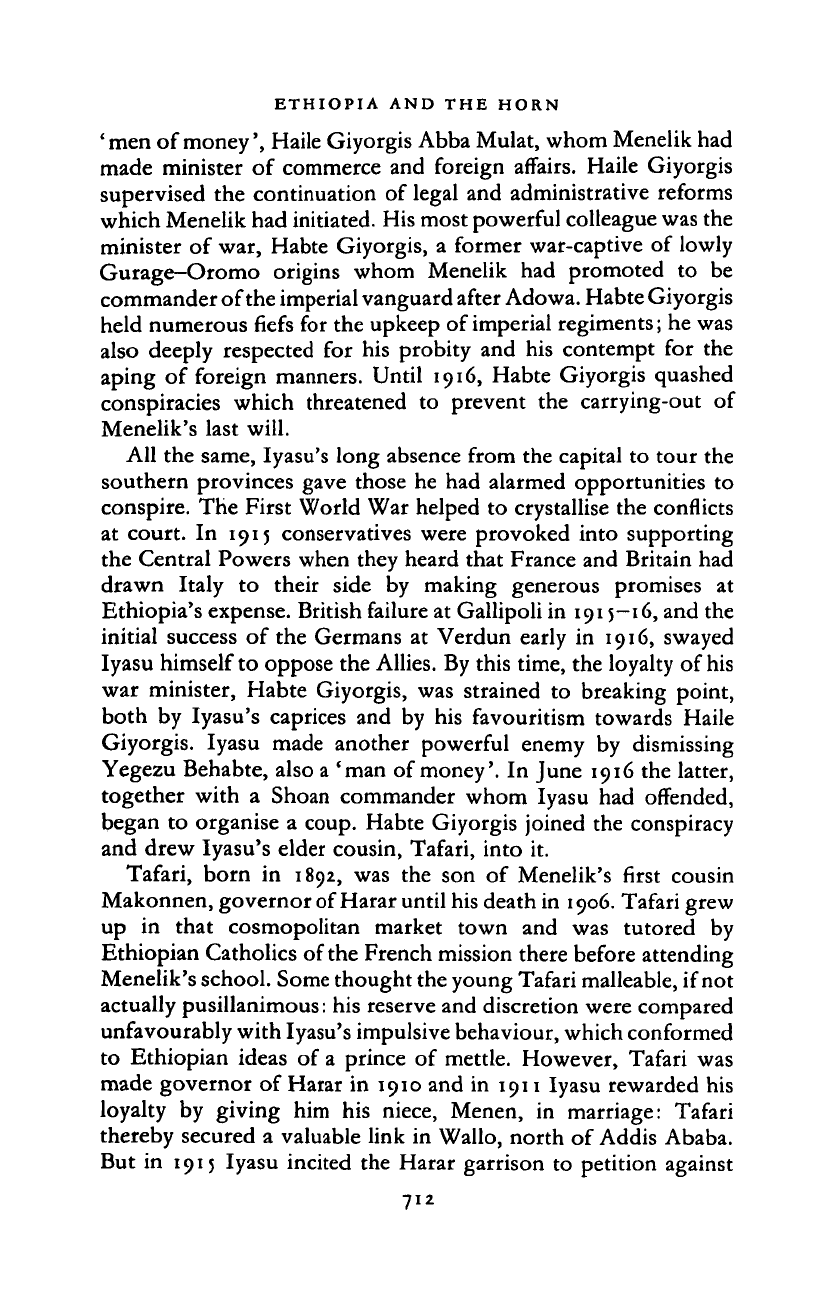
ETHIOPIA AND THE HORN
'men of money', Haile Giyorgis Abba Mulat, whom Menelik had
made minister
of
commerce
and
foreign affairs. Haile Giyorgis
supervised
the
continuation
of
legal
and
administrative reforms
which Menelik had initiated. His most powerful colleague was the
minister
of
war, Habte Giyorgis,
a
former war-captive
of
lowly
Gurage—Oromo origins whom Menelik
had
promoted
to be
commander of the imperial vanguard after Adowa. Habte Giyorgis
held numerous fiefs
for
the upkeep
of
imperial regiments; he was
also deeply respected
for his
probity
and his
contempt
for the
aping
of
foreign manners. Until 1916, Habte Giyorgis quashed
conspiracies which threatened
to
prevent
the
carrying-out
of
Menelik's last will.
All the same, Iyasu's long absence from the capital
to
tour the
southern provinces gave those
he had
alarmed opportunities
to
conspire. The First World War helped
to
crystallise the conflicts
at court.
In 1915
conservatives were provoked into supporting
the Central Powers when they heard that France and Britain had
drawn Italy
to
their side
by
making generous promises
at
Ethiopia's expense. British failure at Gallipoli in 1915-16, and the
initial success
of
the Germans
at
Verdun early
in
1916, swayed
Iyasu himself to oppose the Allies. By this time, the loyalty
of
his
war minister, Habte Giyorgis,
was
strained
to
breaking point,
both
by
Iyasu's caprices
and by his
favouritism towards Haile
Giyorgis. Iyasu made another powerful enemy
by
dismissing
Yegezu Behabte, also a 'man
of
money'.
In
June 1916 the latter,
together with
a
Shoan commander whom Iyasu
had
offended,
began
to
organise
a
coup. Habte Giyorgis joined
the
conspiracy
and drew Iyasu's elder cousin, Tafari, into
it.
Tafari, born
in
1892,
was the son of
Menelik's first cousin
Makonnen, governor of Harar until his death in 1906. Tafari grew
up
in
that cosmopolitan market town
and was
tutored
by
Ethiopian Catholics of the French mission there before attending
Menelik's school. Some thought the young Tafari malleable, if not
actually pusillanimous: his reserve and discretion were compared
unfavourably with Iyasu's impulsive behaviour, which conformed
to Ethiopian ideas
of
a prince
of
mettle. However, Tafari
was
made governor
of
Harar
in
1910 and
in
1911 Iyasu rewarded
his
loyalty
by
giving
him his
niece, Menen,
in
marriage: Tafari
thereby secured
a
valuable link
in
Wallo, north
of
Addis Ababa.
But
in
1915 Iyasu incited
the
Harar garrison
to
petition against
712
Cambridge Histories Online © Cambridge University Press, 2008
